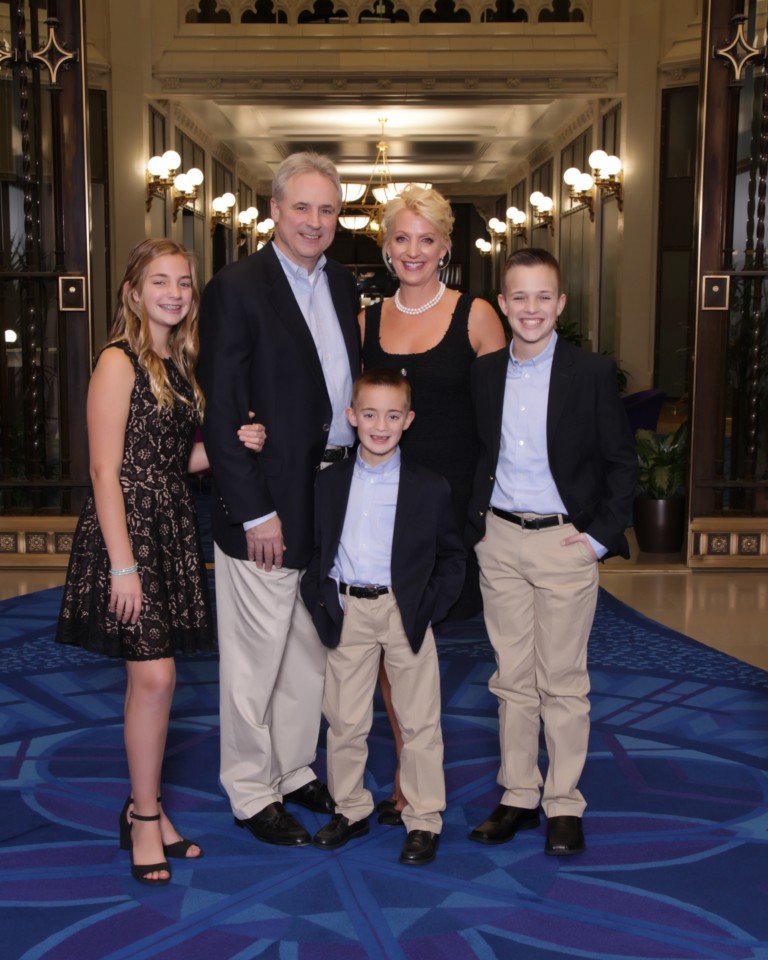Denise Miller, JDA’s chief transformation officer, is no stranger to taking calculated risks and pushing her teams to do the same. She shares how an education that began in pre-med led her to become a strong sales leader (the answer ‘why’ may surprise you!), the importance of having risk tolerance, and why you should have a fail-fast mentality.

Tell us a little about yourself.
I grew up in Red Lion, Pa and I currently reside in Pittsburgh. I attended the University of Pittsburgh for my undergraduate degree and I also received my MBA from the University of Pittsburgh, Katz Graduate School of Business. I’ve been married to my husband Bob for 17 years and we have three children; Nicholas (15), Alexis, (14) and Dominic (9). I enjoy traveling, I am an exercise fanatic, and I’m also a foodie – fortunately, they balance each other out quite nicely!
You are relatively new to JDA – tell us what you did before that?
I spent the past 25 years in the technology industry where I’ve worked for various global software and services companies. Most recently I was Vice President, Digital Transformation & Innovation at SAP where I partnered with C-suite executives to help them reimagine their business models and drive their digital transformation strategies, so they could fully benefit from the disruptive power of the digital evolution. Before joining SAP, I was Vice President Sales for the North American Manufacturing Business at Teradata where I was responsible for setting the industry strategy and direction, developing the lead offers and solutions, and leading the U.S. field organization in successfully executing the go-to-market strategy.
What brought you to JDA?
There were so many reasons! I thought JDA had a unique position in the market: JDA sits in a $15B market that’s growing at 10%; we are a pure-play scale leader with secular tailwinds and strong competitive barriers. I thought the Blue Yonder acquisition was a great investment and it gave JDA instant credibility and references in the artificial intelligence (AI) space and it fueled my passion for innovation. I was also impressed with Girish’s vision for the company and he and Mark (Morgan’s) vision for the newly created role of Chief Transformation Officer.
Speaking of this new role – tell us what you’ve learned and your experience so far?
I’ve had an amazing onboarding experience over the past five months. I participated in the annual operations and budget planning meetings during my first week with JDA and it gave me a great view of the business through the lens of the senior leaders including their perspective on the transformation.
I also had an opportunity to attend the Customer Advisory Board meeting at FocusConnect in Barcelona which provided a view through the lens of our strategic customers. This customer-centric view has been extremely valuable as I develop and deploy programs in support of the transformation.
JDA operates with a “Team of Teams” approach, so I’ve been partnering with Sales, the Chief Customer Office, Marketing, Legal, IT, and the Cloud organization and I’ve been extremely impressed with #SonoranSpirit!

How has your life experience made you the leader you are today?
From a young age, I’ve always taken on leadership responsibilities. When we were growing up, my parents put my older sister in charge when they left the house because she was 4 ½ years older than me. My older sister never wanted the responsibility, so, I would step in and assume responsibility. I’d start by letting my younger sisters know that I was actually in charge and then I did “in-charge” kinds of things, like delegating all of my chores. Ha! Clearly, I had a lot to learn.
Taking risks and life experiences help define you as a leader and help to establish your risk tolerance. It’s certainly easier to take risks when we are young because there is less at stake or we don’t always realize what is at stake. It’s equally important to take risks as you get older. As leaders we need to encourage calculated risk-taking and sometimes even push our teams outside their comfort zones. We need to let them know it’s okay to take risks, especially if we want to drive a culture of innovation; likewise, it’s also okay to fail, but we want to fail fast and learn from it.
Speaking of risks – what is the best risk you’ve taken and why?
Looking back, one of the biggest risks I took was leaving a small town and heading off to a ‘big’ city college to get my degree. No one in my immediate or extended family had gone to college so I didn’t have anyone to lean on for guidance and I wasn’t even sure how I would pay for school. I took out student loans, applied for scholarships and I worked three jobs to pay for college. I developed strong work ethics and I learned a lot along the way.
I started out pre-med but transitioned to a Bachelor of Science degree. I took another risk when I left a good paying job at Westinghouse to pursue my graduate degree with the belief that it would create an entrée into a sales career, which it did. Having a pre-med background really helped me as I approached sales with an analytical eye toward solving customers’ problems. I viewed sales differently than some of my peers and my customer-first mentality contributed to my success early on.
Have you ever been ‘professionally stuck’? How did you become ‘unstuck’?
I was a Sales Director and I wanted a more senior role with more responsibility. I was working for a flat organization at the time and there weren’t a lot of VP roles available. I had some unique ideas about how to grow market share, so I brokered conversations with the COO and CEO. We discussed the market and competition and I shared my ideas to grow market share and they began to see me through a different lens. I didn’t realize it, but they were getting ready to restructure the sales organization. As a result of sharing my ideas with them, the senior leadership team saw me as more than a sales person with a successful track record. They saw me as a high- performance leader that could develop other leaders and they ultimately offered me the VP role.
What’s one leadership lesson you’ve learned and really taken to heart?
Early in my career, I thought leadership was about career-pathing and getting promoted. Fortunately, I had a good mentor who taught me that leadership roles are about serving others and developing others and helping them learn and grow. It was the first time that leadership was reframed as a coach. It completely changed my views on the role and it allowed me to focus on developing the coaching competencies which enabled me to develop high performance teams. That conversation was pivotal in my career and set me on a course of becoming a servant leader.
What is the best advice you ever received? Who gave it to you?
I have a very good friend who was previously a customer. She held various senior leadership roles at companies like PepsiCo, Best Buy and MGM. She encouraged me to surround myself with a diverse group of strong leaders who would become my Board of Advisors. They served as my sounding board and my compass for personal and professional decisions, much like a Corporate Board of Directors.
What female leaders do you admire and why?
Sheryl Sandberg, COO of Facebook and Indra Nooyi, former CEO of PepsiCo are two that immediately come to mind. They have amazing stories and they are both very impressive and accomplished leaders.
What advice to you have for young women seeking a career in technology or a male-dominated field?
Believe in yourself, be strong and confident, don’t be afraid to speak up and lean in! Women see things through a different lens and they bring so much to the table. It is critical that our viewpoints be heard. And create your Board of Advisors!
What do you think is the most significant barrier to women in leadership?
Women! Women tend to be hard on themselves and they carry more self-doubt than men. They often believe that they aren’t ready for the next role or promotion and they’ll talk themselves out of it.
Women can benefit from having an Executive Sponsor who can help them plan their career moves and progress in their careers by developing their brand, strengthening their network and helping them gain valuable exposure to other senior leaders in the company.
A Board of Advisors and an Executive Sponsor can help keep woman on that path to the C-Suite.
What is the one characteristic you believe every leader should have?
EQ – I think emotional intelligence is a critical dimension of leadership and empathy and compassion are essential for building high performance teams. This is a dimension where women often excel.
What book are you reading right now?
Being and Time by Martin Heidegger -it’s a fascinating philosophical read about operating in the present and looking at leadership in a different dimension.
What are three key words you would use to describe yourself?
Outgoing, High-energy, Compassionate

